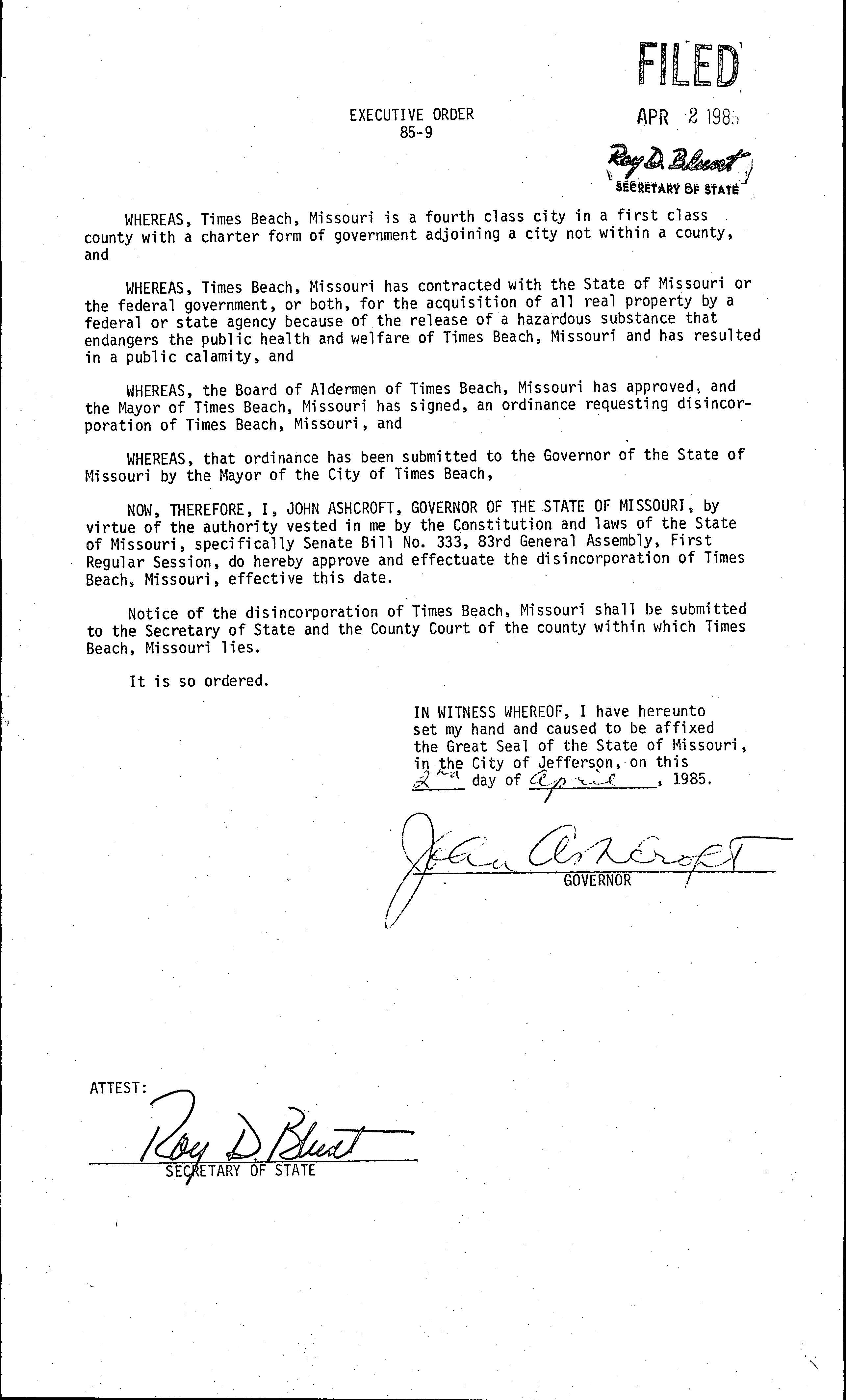| 1950 |
Judge Sam Blair of the Cole County Circuit Court ordered the University of Missouri to enroll Black students on June 27, 1950. Gus Ridgel was the first student to be admitted that August and two other students, Elmer Bell and George Horne, were enrolled at the School of Mines and Metallurgy (now Missouri S&T) in Rolla. |
| 1952 |
Leonor K. Sullivan (St. Louis) was elected as Missouri’s first female U.S. Representative on November 4, 1952. |
| 1954 |
Inmates at the Missouri State Penitentiary initiated a riot on September 22, 1954 partially in protest of prison conditions. Lasting the entire night, there were four inmate deaths, 29 inmate injuries, four guard injuries, and no escapes. The Riot caught national attention, and despite a lengthy report and investigation, conditions did not improve. |
| 1956 |
Gov. Phil M. Donnelly appointed Theodore McMillian as the first Black judge in Missouri on March 16, 1956 to the 22nd Judicial Circuit in St. Louis. He was appointed to the Missouri Court of Appeals-Eastern District in 1972, and to the U.S. 8th Circuit Court of Appeals in 1978. |
| 1956 |
Missouri was awarded the nation’s first contract to build an interstate highway, what is now I-44, on August 2, 1956. Later that day, the state was awarded another contract for a portion of what is now I-70. Construction began on August 13, making Missouri also the first state to begin construction on an interstate highway. |
| 1957 |
The Missouri Commission on Human Rights was created by the Missouri General Assembly on June 8, 1957. Originally focusing solely on racial discrimination, the Commission now investigates complaints of discrimination in housing, employment, and places of public accommodations related to race, color, religion, national origin, sex, and disability. |
| 1960 |
Theodore McNeal (St. Louis) was elected Missouri's first Black state senator on November 8, 1960. |
| 1961 |
Missouri was the 34th state to ratify the Twenty-Third Amendment to the U.S. Constitution extending the right to vote in presidential elections to citizens living in the District of Columbia on March 20, 1961. The amendment went into effect on March 29, 1961. |
| 1962 |
DeVerne Calloway (St. Louis) was elected as the first Black woman state representative in Missouri's General Assembly on November 6, 1962. |
| 1963 |
Missouri was the 34th state to ratify the Twenty-Fourth Amendment to the U.S. Constitution prohibiting poll taxes in voting on May 13, 1963. The Amendment went into effect on January 23, 1964. |
| 1964 |
Created by an Act of Congress on August 27, 1964, the Ozark National Scenic Riverways was established to protect the Current and Jacks Fork Rivers, the first federally protected rivers. The Riverway was formally dedicated on June 10, 1972. |
| 1965 |
The Jefferson National Expansion Memorial (now the Gateway Arch National Park) designed by Eero Saarinen was completed on October 28, 1965. Located on the original settlement site of St. Louis, the weighted catenary arch symbolizes the role of the city in the development of the western frontier. At 630 feet tall, it is the tallest monument in the United States. |

RG107, Missouri Department of Transportation, St. Louis Arch Construction (1965)
|
| 1966 |
Missouri was the 29th state to ratify the Twenty-Fifth Amendment to the U.S. Constitution dealing with issues related to presidential succession on March 30, 1966. The amendment went into effect on February 10, 1967. |
| 1968 |
After the assassination of Martin Luther King Jr. on April 4, 1968, what began as a peaceful protests in Kansas City ended in rioting on April 9, 1968 after the local schools refused to close. When the Kansas City Police deployed tear gas in an attempt to disperse the crowd, rioting erupted in other parts of the city where six people died. |
| 1968 |
The case Jones v. Alfred H. Mayer Co., decided by the U.S. Supreme Court on June 17, 1968, held that Congress could regulate the “badges and incidents of slavery” under the Thirteenth Amendment to the U.S. Constitution. Joseph Lee Jones had tried to buy a house in a white neighborhood in St. Louis, but was denied because he was Black. The case reversed many previous private discrimination precedents set by the court. |
| 1968 |
Missouri's first Black United States congressman, William L. Clay, Sr. (St. Louis), was elected on November 5, 1968. |
| 1971 |
Missouri was the 33rd state to ratify the Twenty-Sixth Amendment to the U. S. Constitution lowering the voting age from 21 to 18 on June 4, 1971. The amendment went into effect on July 1, 1971. |
| 1972 |
Mary Gant (Kansas City) was elected as Missouri’s first female state senator on November 7, 1972. |
| 1976 |
The current Mark Twain National Forest was established on February 17, 1976 after consolidating Clark National Forest and the previous Mark Twain National Forest, both established on September 11, 1939. Consisting of about 1.5 million acres, it represents approximately 11% of Missouri’s forested lands. |
| 1977 |
Gwen B. Giles (St. Louis) was the first Black woman elected to serve in the Missouri State Senate after a special election on December 6, 1977. |
| 1979 |
The case Duren v. Missouri was decided by the U.S. Supreme Court on January 9, 1979. Missouri state law permitted women (and those over age 65) be exempted from jury duty upon request and automatically excused women who failed to show up for jury duty. The Court struck down the exemption agreeing that by making jury duty optional for women, it discriminated against men. |
| 1980 |
Although St. Louis schools were technically integrated, due to redlining and other discriminatory practices, the school districts were separated by race. To alleviate the racial isolation, the U.S. 8th Circuit Court of Appeals determined Missouri was to pay for half the cost of desegregation efforts, including the bussing of students beginning on September 3, 1980. |
| 1984 |
Margaret B. Kelly became the first woman to hold statewide office in Missouri when she was appointed to the office of State Auditor on May 30, 1984 by Gov. Christopher “Kit” Bond. |
| 1984 |
Harriett Woods was the first woman elected to statewide office as Lt. Governor on November 6, 1984. |
| 1985 |
The town of Times Beach was disincorporated by Executive Order 85-9 by Gov. John Ashcroft on April 2, 1985. After investigations by the Environmental Protection Agency (EPA) of horses dying in other locations, Times Beach was completely evacuated early in 1983. Prone to dusty roads, the city would spray the dirt roads with motor oil not realizing it was contaminated with TCDD, also known as dioxin. This largest civilian exposure to dioxin was considered at the time one of the largest environmental disasters in U.S. history. The EPA declared the area safe in 1999 and it is now a part of Route 66 State Park. |

RG5.04, Executive Order 1985-009
|
| 1987 |
Ann K. Covington became the first woman appointed to the Missouri Supreme Court on September 3, 1987 by Gov. John Ashcroft. |
| 1990 |
Cruzan vs. Director of the Missouri Department of Health was decided by the U.S. Supreme Court on June 25, 1990. The first “right to die” case heard before the Court, the Court found it was acceptable to require "clear and convincing evidence" of a patient's wishes for removal of life support. A significant outcome of the case was the normalization of advance health directives. |
| 1990 |
The first portion of the Katy Trail, now the country’s longest recreational rail trail at 240 miles, opened between Rocheport and McBaine in March 1990. The current trail runs from Machens to Clinton. |
| 1992 |
Missouri was the 37th state to ratify the Twenty-Seventh Amendment to the U.S. Constitution regarding salary increases of Congress on May 5, 1992. The amendment went into effect that same day. |
| 1993 |
The Great Flood of 1993 lasting from April to October devastated parts of Missouri and the Midwest breaking record river including the Missouri at Jefferson City on July 30 and the Mississippi at St. Louis on August 1 with over $15 billion in damages nationwide. |

RG107, Missouri Department of Transportation, Aerial of Jefferson City (1993)
|
| 1995 |
Beginning in 1977, lawsuits by the Kansas City School District successfully held the state of Missouri financially liable for the segregation within the boundaries of the district. The school district had wanted a plan to include bussing students within the district, however, a U.S. District Court ruling in 1985 focused on improving educational facilities and programs. On June 12, 1995, the U.S. Supreme Court decided Missouri v. Jenkins overturning the 1985 ruling while still requiring the state of Missouri to correct racial inequality in schools by funding salary increases and remedial education programs. The Court also said, "To hold otherwise would fail to take account of the obligations of local governments, under the Supremacy Clause, to fulfill the requirements that the Constitution imposes upon them." |
| 1995 |
Ronnie L. White became the state's first Black Supreme Court justice when he was appointed by Gov. Mel Carnahan on October 23, 1995. |
| 2001 |
Jean Carnahan became the first woman to serve in the U.S. Senate for Missouri on January 3, 2001. She was appointed by Gov. Roger Wilson to serve after her husband, Gov. Mel Carnahan, died in a plane crash on October 16, 2000, but won the November General Election. |
| 2005 |
Roper v. Simmons was decided on March 1, 2005 by the U.S. Supreme Court. It held that it is unconstitutional to impose capital punishment for crimes committed while under the age of 18 and resentenced Christopher Simmons to life without parole. Simmons was convicted of murdering Shirley Crook at the age of 17. |
| 2005 |
On December 14, 2005, the Taum Sauk Reservoir Dam, part of a hydro-electric power station, breached when water continued to be pumped from the lower reservoir after the upper reservoir was full. It sent more than one billion gallons of water down Proffit Mountain and into Johnson’s Shut-Ins State Park near Lesterville. The new upper reservoir dam, rebuilt from the ground up, is the largest roller-compacted concrete dam in North America. |
| 2006 |
Claire McCaskill became the first woman elected to the U.S. Senate for Missouri on November 7, 2006. |
| 2011 |
Causing 161 deaths and over 1,150 injuries, the tornado that hit Joplin and other areas on May 22, 2011 was the seventh deadliest in U. S. history. |
| 2013 |
On September 29, 2013, members of the Bosnian community in St. Louis (known as “Little Bosnia”) donated a replica of Sebilj (kiosk-shaped public fountain located in Sarajevo) to the city of St. Louis for its 250th birthday. Leaving Bosnia in the 1990s as refugees of the Bosnian War, Missouri has one of the largest concentration of Bosnians outside of Bosnia. |
| 2014 |
The Black Lives Matter movement began on social media in 2013 but gained national attention in 2014 after the death of eighteen-year-old Michael Brown at the hands of a white police officer on August 9, 2014 in Ferguson. Demonstrations and riots received national press coverage following his death. Ultimately, a grand jury did not indict the officer who shot Brown. The Department of Justice concluded the officer had not violated federal law, but both the Ferguson Police Department and Municipal Court had long engaged in actions that unfairly and detrimentally affected members of the Black community. |
| 2018 |
Gov. Eric Greitens resigned from office on June 1, 2018 after a May 29 court ruling ordering him to turn over documents from his political non-profit to the Missouri House Committee regarding allegations of misconduct. Greitens was the first Missouri governor to resign without appointment to another position. |
| 2020 |
Cori Bush (St. Louis) was elected as the first Black U.S. Congresswoman for the state of Missouri on November 3, 2020. |
| 2020 |
Emily Weber (Kansas City) was elected as the first female Asian American to serve in the Missouri General Assembly on November 3, 2020. |
| 2021 |
Robin Ransom was appointed as the first Black female Missouri Supreme Court Judge on May 24, 2021. |
| 2023 |
Vivek Malek became the first person of color and Indian American to hold statewide office in Missouri when he was appointed to State Treasurer on January 17, 2023 by Gov. Michael Parson |